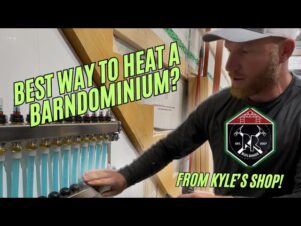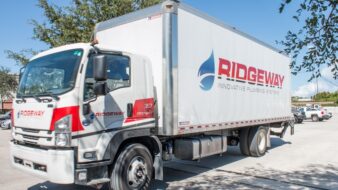Valves play an essential role in plumbing systems. They control water flow by limiting or stopping the flow based on placement. But one quick trip down the plumbing aisle, and you’ll quickly find that PVC valves come in various styles. Knowing what valve is needed for which purpose takes some skill.
As a general rule, if you’re looking for a non-corrosive plumbing option or you have specific needs to meet hygiene standards or green building goals, PVC valves check all the right boxes. While they are technically made from a plastic polymer, these valves have become a preferred option over most metal alternatives.
What is a PVC Valve?
Traditionally, plumbing valves are made from different types of metals. Brass, cast iron, bronze, stainless steel, alloys, galvanized metals, and others serve different purposes. For example, salt water is highly corrosive and requires stainless steel or PVC fittings as other metals will easily rust.
PVC, or polyvinyl chloride, is not a metal. It’s a synthetic plastic polymer that provides a highly durable and cost-effective option for plumbing fixtures. PVC has been around the plumbing world a little longer than you may have realized. Pipes made from this polymer were first introduced in 1932. By the 1970s, pipes and valves made from PVC had found their way to mainstream use.
These valves are some of the most versatile, fitting appropriate uses across many applications. PVC valves can be utilized for:
- Domestic Irrigation: PVC is the top choice for providing water for landscaping maintenance.
- Water Treatment: PVC is a chemical-resistant, non-corrosive material ideally suited for water treatment facilities.
- Water Features and Wellsprings: The same properties that make PVC a smart choice for irrigation systems also make it a natural choice for garden water features.
- Aquariums: PVC is one of the few materials aside from stainless steel that can resist the corrosion of salt water, making it a good choice for aquariums.
- Landfills: Any plumbing systems in landfills need to tolerate various chemicals, making chemical-resistant PVC a natural choice.
- Swimming Pools: This same chemical-resistant property makes PVC the best choice for chlorinated swimming pools.
- Chemicals: PVC is the best choice for a wide variety of corrosive chemicals.
- Food: The same properties that make PVC environmentally friendly also lend themselves well to food safety. PVC valves are a common choice in residential and commercial kitchens.
- Healthcare: More than 10 million quality-control tests prove that PVC plumbing fixtures are sterile and hygienic.
Benefits of Using PVC Valves
PVC plumbing valves are common across nearly every application, from residential construction to healthcare and manufacturing. It provides a lower-cost option to most metal valves with comparatively similar properties.
For starters, PVC is manufactured with energy-efficient practices so choosing this material over other options is a good step towards greener building practices. PVC also promotes cleaner water, keeping the supply free from sediment contamination.
Plus, most contractors appreciate the lower material cost of PVC fittings. PVC valves offer a durable, chemical-resistant, and corrosion-resistant plumbing option that is lightweight and easy to install.
Types of PVC Valves
As the popularity of PVC valves has grown, there is no shortage of options on the market. Even within each basic type of PVC valve, you’ll find different sizes for different uses. Here are a few of the most common valves.
PVC Ball Valves
A ball valve is a simple on or off-style valve frequently used in landscaping applications. It provides a water-tight seal using a ball to restrict or allow the flow of water. Ball valves are recognized for speed and efficiency. They’re a great option for emergency shut-off valves. If you’re choosing between a ball valve and other styles of on-off valves, speed of operation should be the primary consideration.
PVC Gate Valves
A gate valve is an on-off style valve best suited for low-pressure flows in larger diameter pipes. Gate valves become challenging to operate under higher pressures. Gate valves essentially do the same thing as a ball valve, but with a few more problems down the road.
PVC Check Valves
A check valve is a specialty valve that is designed to prevent backflow. While most valves are controlled by an external handle, a check valve is specifically designed to function internally based on the flow of material.
PVC Butterfly Valves
Butterfly valves are flexible control valves that allow the user to have precise control over water flow. These valves can function to restrict flow or entirely shut it off. A butterfly valve uses a disc to block water flow. Butterfly valves are used for variable control with a quick response.
PVC Diaphragm Valves
A diaphragm valve is a little less common than many of the other options on our list. These valves also serve a very specific purpose. A diaphragm valve is a regulatory valve that is used to control pressure.
PVC Foot Valves
A foot valve is a particular type of check valve fitted with a strainer. It’s placed at the end of a pipeline and assisted by a spring that opens and closes the valve when a pump turns on or off. A foot valve is designed to prevent fluid from draining out of a pump so that the pump remains primed and functional.
Final Thoughts on the Different Types of PVC Valves and Their Benefits
Polyvinyl chloride, or PVC, is commonly found in plumbing systems ranging from residential to commercial and industrial. While some pipes are still made from various metals, PVC has proven to be a durable and cost-effective alternative. Plus, as an added bonus, PVC offers several environmentally friendly benefits ranging from eco-friendly manufacturing processes to cleaner water.
Choosing the correct valve requires a thorough understanding of your needs and application, along with your options. In most cases, there is a PVC valve option that can save you money with a lower ticket price and long-lasting durability, providing clean water for a variety of commercial and residential applications.
 Author Bio: Mark Ligon is the marketing manager at Commercial Industrial Supply, a supplier of commercial PVC and CPVC pipe, fittings and valves. Mark’s experience in industrial filtration has provided valuable relationships with suppliers, manufacturers and vertical resources online. CFS has more than a decade of experience providing name brand/quality products to the industrial filtration market. He enjoys educating businesses on the parts of piping systems so plumbing managers can make informed decisions.
Author Bio: Mark Ligon is the marketing manager at Commercial Industrial Supply, a supplier of commercial PVC and CPVC pipe, fittings and valves. Mark’s experience in industrial filtration has provided valuable relationships with suppliers, manufacturers and vertical resources online. CFS has more than a decade of experience providing name brand/quality products to the industrial filtration market. He enjoys educating businesses on the parts of piping systems so plumbing managers can make informed decisions.




Join the conversation: